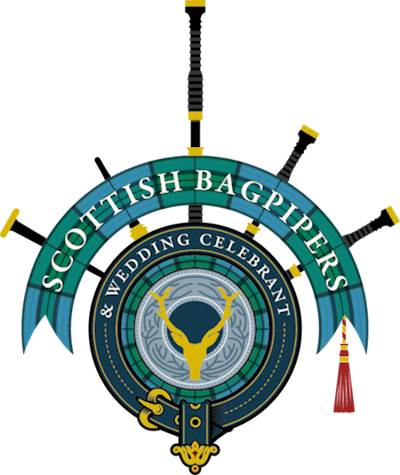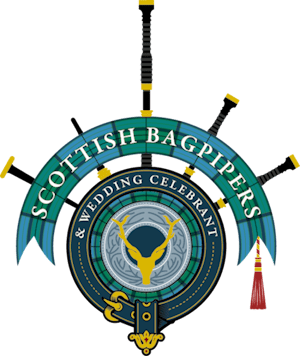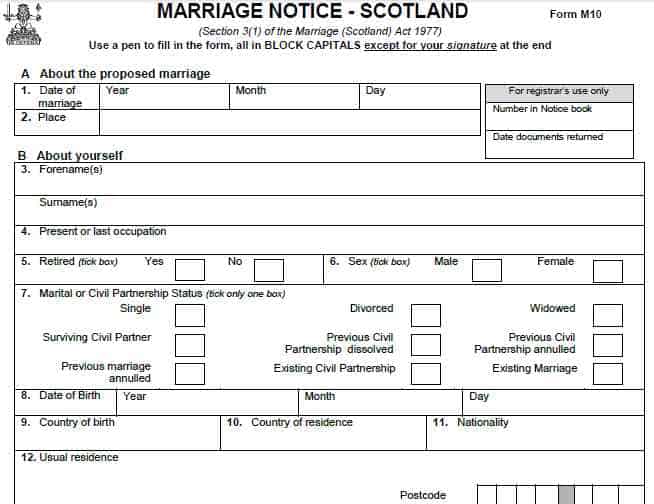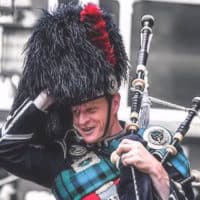getting married
in Scotland
How to get married in Scotland
So firstly, you’ve said YES – my congratulations to you both!
Now you need to start thinking about all the big and little things needed for your wedding. Besides deciding top priority things like when you would like your Wedding Bagpiper to play on your day(!), one of the most important things you need to do is to get everything in order so you can hold a legally-binding marriage ceremony – one which fits your values and beliefs as a couple.
When it comes to getting married, Scotland has some (good!) differences compared to many other countries, including England, Wales and Northern Ireland.
This is a summary of the different types of Scottish wedding ceremonies, and some hopefully useful information and resources to help set you on your way up the aisle.
Types of Wedding Ceremony
In Scotland we have three types of Marriage Ceremonies – Belief, Civil or Religious:
Belief Ceremony
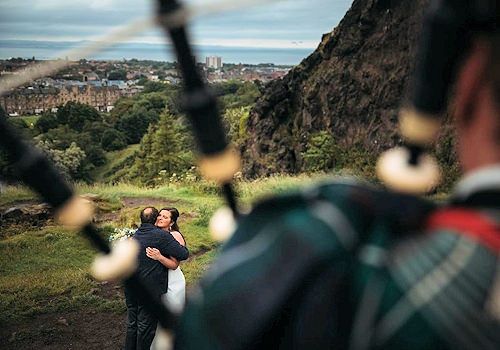
A Belief Ceremony is non-religious ceremony conducted by a celebrant for opposite or same-sex couples.
This type of wedding is officiated by a celebrant, who will create a ceremony which is personalised to the couple being married. Couples may tailor the entire content of their wedding ceremony them as a couple. With your Celebrant’s help, you have the freedom to create your own unique Order of Ceremony and make your marriage all about both of you, and truly your own!
A celebrant-led wedding has no restrictions on what is included. Unlike a civil or religious wedding, a celebrant-led wedding will focus on the couple and what is special and unique about them, as opposed to legalities or religious requirements.
This type of ceremony can be legally binding in Scotland (not in England and Wales!) if your celebrant is affiliated to a government-approved belief group such as the Humanist Society Scotland.
Alternatively, you may wish to have a quick legal legal marriage ceremony with a Registrar, before holding your own own truly bespoke wedding with your family and friends in attendance. This is the norm in England and Wales, where only civil and religious (Church of England) marriages are legally binding.
There are many different types of celebrants. Not only are there Humanist celebrants, but also many independent celebrants like myself, who specialise in different themes. My own focus is upon Scottish wedding traditions.
Civil Ceremony
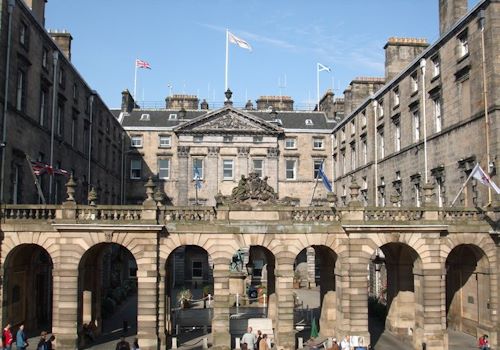
A Civil Marriage (not to be confused with a Civil Partnership) is a non-religious ceremony conducted by a district Registrar for both same and opposite-sex couples. The ceremony is conducted by a district Registrar and can take place in a Register Office or another approved place.
Same-sex couples who formerly had a Civil Partnership can convert it to a marriage by completing and signing an application form in the presence of a Registrar. Your marriage is then legally recognised as having started on the date you registered your Civil Partnership. It doesn’t matter if your earlier Civil Partnership was conducted elsewhere in the UK.
A Civil Wedding focuses upon the legal aspects of marriage only. There is very little scope to personalise your wedding to include rituals, readings or any elements which have a special meaning to you. Registrars simply do not have this remit.
Because of this, many couples will have a very basic legal ceremony conducted by a Registrar, with only themselves and their witnesses attending. They then have a celebrant-led ceremony with their friends and family attending, which is their official wedding, which the celebrant makes unique to them.
Religious Ceremony
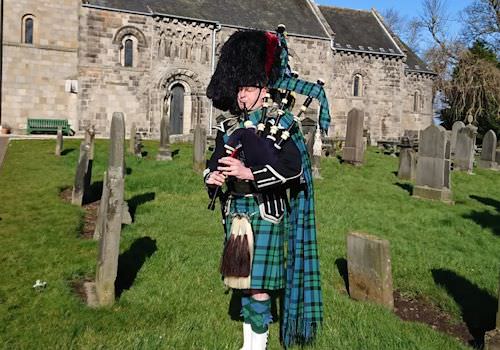
A religious ceremony is conducted by a religious official of your faith such as minister, priest or imam. A Church of Scotland ceremony does not need to be held in a place of worship, as long as the minister approves. Followers of other faiths are welcome too.
Roman Catholic ceremonies are slightly different. These must be held within a place of worship which is in regular use. Either you or your partner has to have been baptised in the Catholic Church. If one of you isn’t Catholic you’ll require special dispensation from a local Catholic Bishop and you may need to attend marriage preparation classes.
Note: Only Church of Scotland ministers and deacons have automatic authority to legally marry you, and that’s only if you are an opposite-sex couple. Clergy from other religions and denominations need to also become a government-authorised marriage officer to carry out marriage legalities.
Religious Same-Sex Marriages
Progress is slow I’m afraid.
Today the Scottish Episcopal Church is the only religious denomination in Scotland to conduct same-sex marriages with no strings attached, as reported here.
The Church of Scotland at their 2022 General Assembly voted in favour of allowing ministers and deacons to conduct same-sex marriages. However, it is at the discretion of individual ministers and deacons as to whether or not they will actually conduct any such ceremony.
While Church of Scotland ministers and deacons have automatic legal authority to conduct opposite-sex marriages, they do not have automatic authority to conduct same-sex marriages unless they have government authorisation to become a marriage officer (also the same for the Scottish Episcopal Church above).
The Scottish Catholic Church and the Free Church of Scotland do not conduct same-sex marriages.
The Legal Bit
Here are some interesting legal differences between being married in Scotland, compared to England and Wales
Scots Law allows you to marry anywhere, as long as you have a Wedding Bagpiper(!), and your wedding is officiated by a religious official, Registrar or Humanist Society Scotland celebrant. Humanist marriages in Scotland have been legally recognised in Scotland since 2005, unlike in England and Wales where they are not legally recognised.
In Scotland you can also get married at any time of the day, whereas in the rest of the UK you can only get married between 8am and 6pm. This is why most vampires get married in Scotland.
Your Scottish Wedding Checklist
To hold a legally-binding marriage ceremony in Scotland, as you’d expect there are a few things you’ll need to do:
- Be the age of 16 or over!
Scots Law allows for people to get married from the age of 16 or over (age 18 in England and Wales).
- Check the Scottish Government’s guidance
The Scottish Government’s Marriage in Scotland webpage is a great starting point to find out about Scotland’s legal marriage process. More detailed information and access to the required paperwork can be found on the I Want to Get Married in Scotland page of the National Records of Scotland, the government body responsible for marriages in Scotland (my sister works here).
- Find your Marriage Officiant
Once you know where you wish to be married, you’ll need to find a Registrar, Humanist Celebrant or religious official to officiate your ceremony and make it legally binding. Each district in Scotland has its own Registry Office(s) where you can book a Registrar from. Find a Registrar from the National Records of Scotland’s Directory of Registrars. If you wish to hold a Humanist ceremony (I like these!), then go to the Humanist Society of Scotland and Find your Celebrant.
- Submit your Marriage Notice
Regardless of the type of ceremony you’re holding, you must each submit an M10 Marriage Notice form and your fee to the Registrar of the district where your marriage will take place. This must be received a minimum of 29 days prior to your marriage, and no more than three months in advance. If you want peace of mind it’s best to do this early as possibe. Contact the Registrar first. Remember this isn’t your Registrar or Celebrant’s first gig! They will give advice and answer any questions you may have. See the M10 Marriage Notice Guidance Notes and Form. If you’re having a religious or Humanist Society marriage, the religious official or celebrant will provide accompanying information which must also be submitted with the M10 form.
- Proof of identity and residency
You must each provide your Birth or Adoption Certificates as well as valid passports and proof of your residency. If you’re eloping to Scotland from a country outwith the European Economic Area (EEA), then you’ll need to apply for a Marriage Visa. This you’ll need to submit with a Declaration of Immigration Status Form.
- Previously Married?
If either of you have previously been married, you must provide a Decree of Divorce or Marriage Dissolution document. If this isn’t in English you’ll need to provide a certified translation carried out by a professionally qualified translator.
- Witnesses
For your marriage to be legally binding in Scotland it must be witnessed by two persons aged 16 years or over. If only the two of you are travelling this can be tricky. However, your witnesses don’t need to be arranged in advance. Myself and photographers have often been the formal witnesses to a wedding. It’s an honour. Indeed, I’ve been pulled off the street on more than one occasion to witness a wedding in the Edinburgh Registry Office!
If you are accompanied by your witnesses though, you can include their details along with your M10 Marriage Notice form, and their names will be added to the official Marriage Schedule document.
- The Marriage Schedule
The Marriage Schedule is the document produced by your Registrar after receiving and verifying all the documents you’ve submitted. If you’re holding a religious or Humanist ceremony which isn’t held in a Registry Office, you must collect this from your Registrar before your wedding. It’s usually available seven days prior to your wedding. You can’t be married without it!
You must give your Marriage Schedule to the person conducting your marriage ceremony. Both of you, your two witnesses and the celebrant will sign your Marriage Schedule during the Signing of the Register. Now your marriage is legally binding!
- And don’t forget…
You must return your signed Marriage Schedule to the district Registry Office within three days (days, not working days!) of your ceremony. If you don’t do this, all your hard work will have been in vain!
This is your final step to make your marriage fully legit and legal. Congratulations!!
Eloping
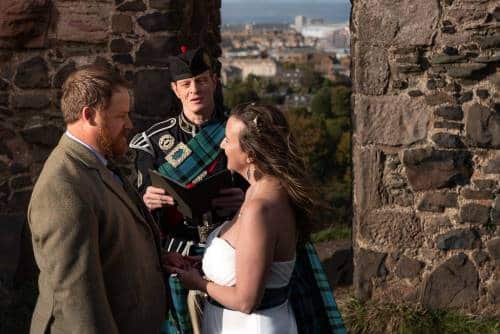
Have you already held your legally-binding wedding ceremony, but wish to also hold a truly personalised, symbolic ceremony?
I can not only play the bagpipes for you, but I can create and officiate your symbolic ceremony too! Find out what I can do when officiating your symbolic ceremony!

Have you already held your legally-binding wedding ceremony, and wish to also hold a truly personalised, symbolic ceremony?
I can not only play the bagpipes for you, but I can create and officiate your symbolic ceremony too! Find out what I can do to create your symbolic ceremony!
